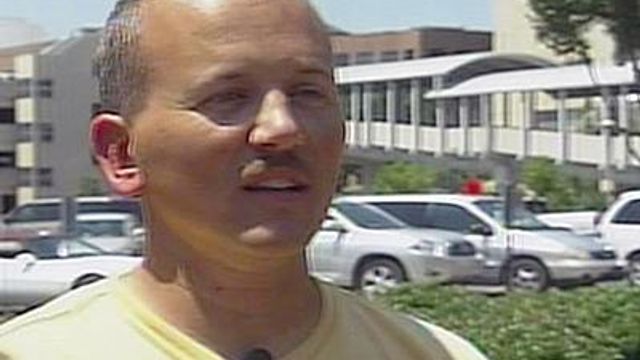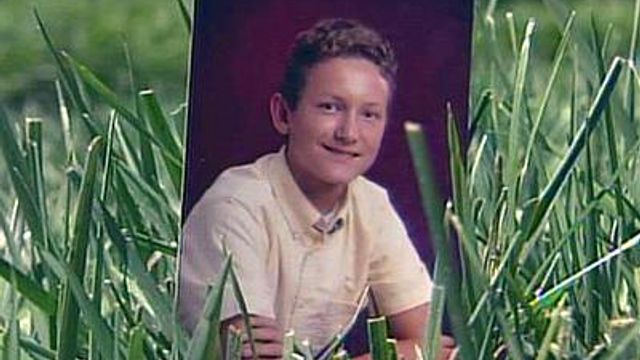Local News
Teen's life-threatening illness was sudden, dad says
Matthew McKinney, 14, was swimming in Hope Mills Lake when he likely was exposed to a naturally occurring bacteria that has left him with a life-threatening rare infection.
Posted — UpdatedCHAPEL HILL, N.C. — June 14 was supposed to be just another summer day for 14-year-old Matthew McKinney and his family and friends – an afternoon of fun in the sun and the water at Hope Mills Lake.
The rising ninth-grader at Jack Britt High School and his friends swam and played in the water – doing what his father, Brian McKinney, says boys do.
"Boys will be boys. They were playing catch, trying to see who could throw rocks the farthest," McKinney said.
Around 2 a.m. the next morning, though, Matthew awoke complaining of a fever, runny nose, nausea and an irritation on the left side of his nose. He went to the emergency room at a local Fayetteville hospital, where doctors prescribed him medicine and sent him home.
Matthew returned to the hospital several times thereafter and was examined by multiple specialists.
"There was always something out of the loop that they had never seen before," McKinney said.
A week later, the left side of his face had swollen, his teeth had started to spread, the roof of his mouth was gone and his tissue had started decaying. The infection had spread to his lungs and sinuses.
The infection was now a life and death situation.
"It goes from a fever with a runny nose to your son's dying – 'We're going to try to save his life,'" McKinney said. "It's so sudden. There's nothing that can prepare you for this."
Matthew had been diagnosed with a rare infection caused by a naturally occurring bacterium called chromobacterium violaceum that he likely picked up while in Hope Mills Lake.
At one point, his father said, Matthew had described how when picking up a big rock from the lake floor that bubbles would rise up from the ground.
"That's where the bacteria primarily lives," McKinney said.
Matthew is now at UNC Hospitals in Chapel Hill, where, a hospital spokesman said Thursday, he was listed in fair condition in the intensive care unit.
The infection has completely disfigured his face, so much so that McKinney said he did not recognize his son. Doctors are still testing to determine if the infection has reached his brain.
"Right now, he's still in a critical state," McKinney said. "Bless his heart, he has no idea that half of his face is gone. So, when he wakes up, I want to make sure I'm there by his side."
Cumberland County public health officials have called the case "tragic and isolated," and UNC Hospital's pediatric infectious disease expert, Dr. Tom Belhorn, says chromobacterium violaceum is prevalent throughout the environment, especially in soil.
"It's probably in the bottom of most lakes and ponds throughout the Southeast," Belhorn said. "It's very rare to cause an infection or any problems."
According to the U.S. Centers for Disease Control and Prevention, there have been fewer than 150 reported cases of infection reported worldwide between 1927 and 2005.
About half of those who are infected have underlying immune deficiencies, the most common having to do with white blood cells that fight off infection, Belhorn said.
Belhorn said he's unsure right now how the bacteria got into Matthew's body – it can be transmitted through a break in the skin, through the eyes or by inhaling water.
"This is like something that's on TV," McKinney said. "It's unreal. It's unimaginable."
Matthew has had several surgeries to stop the spread of the infection and he has been heavily sedated but it could be several months before his wounds have healed.
"With infections like this, you have to surgically manage it, meaning take away the tissue and make sure you have good antibiotic management," Belhorn said. "He is a trooper, and is already getting better."
Doctors tell McKinney that it's still too soon to begin thinking about reconstructive surgery and that Matthew will have to take antibiotics long-term for the infection in his lungs and for a few other problems.
"He went in. They said they were going to put him out for a biopsy – no more needles and yanking flesh from his body. He's going to wake up with half his nose gone and his mouth," McKinney said. "So I don't know what he's going to go through."
• Credits
Copyright 2024 by Capitol Broadcasting Company. All rights reserved. This material may not be published, broadcast, rewritten or redistributed.






